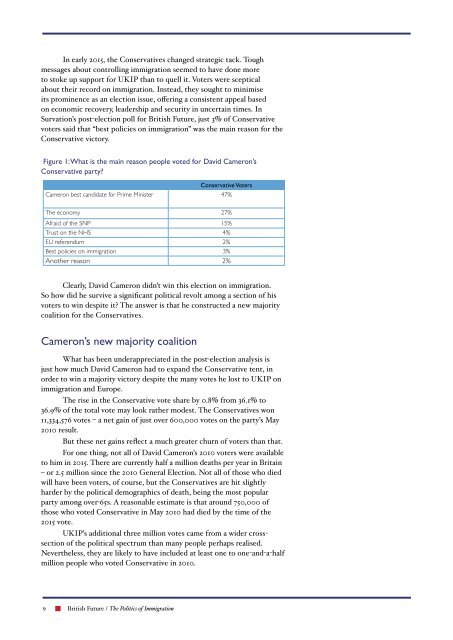THE POLITICS OF IMMIGRATION
The-politics-of-immigration
The-politics-of-immigration
You also want an ePaper? Increase the reach of your titles
YUMPU automatically turns print PDFs into web optimized ePapers that Google loves.
In early 2015, the Conservatives changed strategic tack. Tough<br />
messages about controlling immigration seemed to have done more<br />
to stoke up support for UKIP than to quell it. Voters were sceptical<br />
about their record on immigration. Instead, they sought to minimise<br />
its prominence as an election issue, offering a consistent appeal based<br />
on economic recovery, leadership and security in uncertain times. In<br />
Survation’s post-election poll for British Future, just 3% of Conservative<br />
voters said that “best policies on immigration” was the main reason for the<br />
Conservative victory.<br />
Figure 1: What is the main reason people voted for David Cameron’s<br />
Conservative party?<br />
Conservative Voters<br />
Cameron best candidate for Prime Minister 47%<br />
The economy 27%<br />
Afraid of the SNP 15%<br />
Trust on the NHS 4%<br />
EU referendum 2%<br />
Best policies on immigration 3%<br />
Another reason 2%<br />
Clearly, David Cameron didn’t win this election on immigration.<br />
So how did he survive a significant political revolt among a section of his<br />
voters to win despite it? The answer is that he constructed a new majority<br />
coalition for the Conservatives.<br />
Cameron’s new majority coalition<br />
What has been underappreciated in the post-election analysis is<br />
just how much David Cameron had to expand the Conservative tent, in<br />
order to win a majority victory despite the many votes he lost to UKIP on<br />
immigration and Europe.<br />
The rise in the Conservative vote share by 0.8% from 36.1% to<br />
36.9% of the total vote may look rather modest. The Conservatives won<br />
11,334,576 votes – a net gain of just over 600,000 votes on the party’s May<br />
2010 result.<br />
But these net gains reflect a much greater churn of voters than that.<br />
For one thing, not all of David Cameron’s 2010 voters were available<br />
to him in 2015. There are currently half a million deaths per year in Britain<br />
– or 2.5 million since the 2010 General Election. Not all of those who died<br />
will have been voters, of course, but the Conservatives are hit slightly<br />
harder by the political demographics of death, being the most popular<br />
party among over-65s. A reasonable estimate is that around 750,000 of<br />
those who voted Conservative in May 2010 had died by the time of the<br />
2015 vote.<br />
UKIP’s additional three million votes came from a wider crosssection<br />
of the political spectrum than many people perhaps realised.<br />
Nevertheless, they are likely to have included at least one to one-and-a-half<br />
million people who voted Conservative in 2010.<br />
9 British Future / The Politics of Immigration


